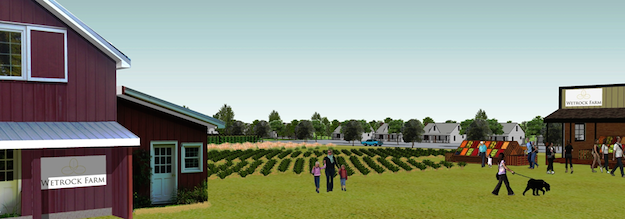PLANNED DURHAM “AGRIHOOD” BRINGS A FARM-CENTERED MODEL OF SUBURBAN DEVELOPMENT

Photo: Wetrock Farm
Protecting the balance between city and country
North Carolina offers a unique blend of country and city. Even the largest metropolitan areas in the state still have land in agricultural use just a few miles outside of town. Many North Carolinians find ways to enjoy the natural beauty and tranquility of the country, as well as the job and cultural opportunities that cities have to offer. However, if current urban growth predictions prove correct, the rural lands outside of town will likely be taken out of agricultural use to become sprawling suburbs.
A group of Durham based developers have plans for a new type of subdivision which could offer a model of how to preserve woods and farmland, while meeting the housing needs of a growing metropolis. The proposed development, called Wetrock Farm, will have 141 homesites built around 140 acres of conserved forest and pasture land, and will include a professionally managed, amenity farm and muscadine vineyard. The Home Owner Association dues will include a subscription to the neighborhood CSA, delivered weekly to every doorstep.
Conservation Development Keeps Nature Close
The 230 acres that Wetrock Resources has under contract was a tobacco farm until 2000. About 80 acres are cleared pasture, and the rest is mostly hardwood forest with a creek running through it. The property is 10 miles (about a 20 minute drive) from downtown Durham, in an area that is still predominantly rural today,
Wetrock Farm is the latest in a growing trend of conservation development projects happening across the state. In conservation development, a large area of land is protected from development with a conservation easement, creating a preserved common space that increases the value of the individual lots surrounding it. Most of Wetrock Farm’s larger lots will have backyards that open onto the conserved lands, and all residents will enjoy access to the network of hiking trails running through it. Rick Bagel, founder of Wetrock Resources and lead developer on the project, predicts the home prices will range between $300,000 and $400,000.
With Durham projected to grow at a steady pace for the next decade, much of the surrounding farm land is at risk of being taken out of agricultural use, replaced with strip malls and traditional suburban development. Bagel hopes that Wetrock Farm will serve as a model for how to meet the growing demand for homes near urban areas, without spoiling the countryside and pushing agriculture into more remote areas.
Farm-to-Table Living
Wetrock Farm is the first master-planned community to include an amenity farm in North Carolina, but at least a dozen similar projects are already well underway in other parts of the country. As we’ve reported previously, developers have begun incorporating farms into neighborhoods, often called “agrihoods,” in order to attract a new generation of home-owners, more interested in access to healthy, organic food than in an ecologically destructive golf-course.
Bagel is confident that the good food movement is here to stay, and sees neighborhood farms as the next step in regaining a sense of where our food comes from. Residents will be able to watch plants grow from seedlings to maturity, and will be able to see for themselves all the work that goes into growing food organically.
Wetrock Resources will own and manage the farm in the subdivision. Residents will have no obligation to work on the farm, but there will be ample volunteer opportunities. The farm manager will live in an on-site farmhouse, and Bagel intends to offer a profit-sharing agreement, to ensure that the farm manager is incentivized to pay close attention to community preferences, and try and meet as much of the community’s food needs as possible. As a part of the neighborhood, the farmer will be able to learn community preferences, and teach residents ways to prepare crops they are less familiar with.
The farm will also have a farm stand, where excess produce from the farm will be available for residents and people driving by on North Roxboro Road. The majority of food available at the farm stand needs to be grown on-site, but it will also sell other food staples in order to reduce the amount residents need to travel to a grocery store.
Rekindling connection to the natural world
Residents will be able to enjoy a bit of the back-to-the-land lifestyle, without sacrificing modern amenities. The proposed development includes a fitness center, as well as a pavilion for large gatherings and educational workshops.
However, unlike in more traditional subdivisions, parents, returning from a difficult day at the office, will be able to take a quiet walk through the woods to try and let go of workday stress. Children getting home from a day spent sitting at a desk in a classroom can race down to the creek to try and catch frogs or forage for hickory nuts. Elders can help the farm manager prepare for the changing of the seasons. The community as a whole will be in closer proximity to natural cycles of birth and decay.
- Categories:


